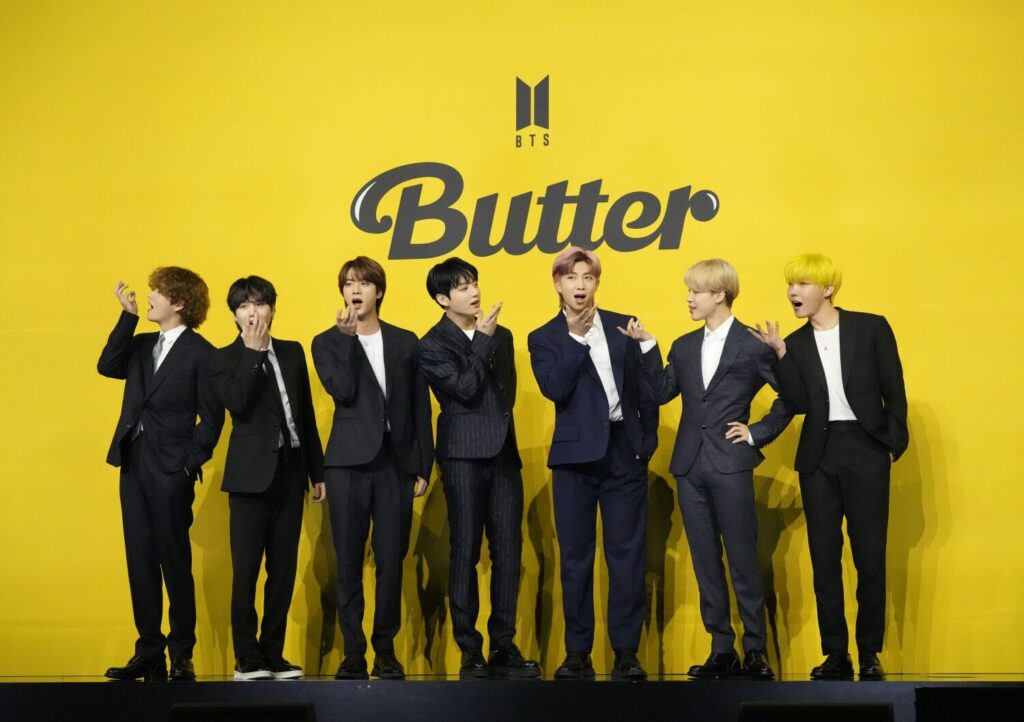A war between two of South Korea’s biggest music companies, playing out over corporate filings, lawsuits and YouTube videos, could determine control of the enormous global K-pop market.
The battle between HYBE, home to global superstars BTS, and the South Korean agency SM Entertainment is complicated, but the allegations of clandestine offshore tax havens and hostile stock takeovers have transfixed K-pop fans for weeks. The tumult has roped in some of the biggest acts in K-pop, and could spill over well beyond that genre.
So, who are these companies?
HYBE is an entertainment firm that controls roughly 52% of the South Korean pop market, thanks to BTS and other popular K-pop acts like Tomorrow X Together and Seventeen. In 2021, the company, then known as Big Hit Entertainment, rebranded as HYBE and partnered with the American music manager Scooter Braun, who sold his Ithaca Holdings company to the South Korean corporation for $1.05 billion. With Braun as the company’s U.S. chief executive, HYBE recently acquired Quality Control, the Atlanta hip-hop label and management firm behind Migos, Lil Yachty, Lil Baby and City Girls. (Braun, as you may recall, purchased, then flipped, the master recordings of Taylor Swift against Swift’s wishes; she is now in the midst of rerecording and rereleasing her first six albums.)
SM Entertainment is one of the largest and most influential talent agencies and record labels in South Korea, valued at around $4 billion. SM first came to global prominence with 2000s-era groups like Girls Generation, SHINee, EXO and Super Junior, and currently manages bestselling acts NCT, Super M and Aespa.
How did the feud between HYBE and SM Entertainment start?
Earlier this month, HYBE bought a 14.8% share in SM Entertainment and became its largest single shareholder. HYBE plans to buy up to 40% of the company — at an estimated price of just over a trillion South Korean won, approximately $900 million.
Why is this causing so much consternation in K-pop?
Jang Cheol Hyuk, the chief financial officer of SM, published a video last weekend explaining how HYBE’s growing stake (and possible takeover) of SM would lead to monopoly power in K-pop.
According to Jang Cheol Hyuk, if HYBE fully controlled SM, they would own two-thirds of the South Korean pop music market. (Fortune reported that BTS, which is currently on hiatus while members perform their mandatory military service, alone accounts for around 0.2% of South Korea’s entire GDP.) “This is clearly a hostile takeover attempt,” Jang Cheol Hyuk said, adding that “HYBE’s acquisition of SM will undermine fair competition.” He also cryptically alluded to a “wrong past of ‘SM for a certain shareholder’ which we have been trying so hard to break free from.”
Who and what is he talking about?
SM Entertainment’s founder, Lee Soo-Man, who left the company in October. After SM ended its deal with Lee’s production company, HYBE bought its SM Entertainment shares from him.
Why did Lee Soo-Man split with SM in the first place?
Depends on who you ask. In September, Lee Soo-Man announced that he would step back from the company, citing internal pressures from other shareholders and a long-standing desire to dial down his production duties.
Yet SM Entertainment’s current CEO, Lee Sung-Soo (the nephew of Lee Soo-Man’s late wife), posted a video last week accusing Lee Soo-Man of maneuvering his personal business interests into a Hong Kong-based company, CT Planning Limited, that could allow him to avoid paying South Korean taxes.
The financial allegations are complicated, but Lee Sung-Soo said he believed that Lee Soo-Man muscled SM into signing sweetheart consulting deals, wherein SM’s artists would sign overseas deals with Lee Soo-Man’s own firm, and he would take a 6% cut of SM’s album sales for 70 years and 3% of management fees until 2026.
On Feb. 17, a group of 208 SM Entertainment employees signed a letter saying they “have been completely used in former chief producer Lee Soo Man’s illegal acts including fraudulent actions for his personal interests and tax evasion. We cannot be used by HYBE’s illegality and expediency again.”
Did HYBE weigh in on this drama?
In a public statement, HYBE said SM Entertainment created all these problems themselves, and HYBE is coming in to solve them. Questions of tax evasion and backroom dealmaking “are all revealing problems with SM’s corporate governance, and unfortunately, all of these problems occurred internally at SM.”
This sounds like a K-pop season of “Succession.”
It sure does! There are some stranger allegations too — including that Lee Soo-Man forced the K-Pop group Aespa to incorporate pro-environmental messages into their music, leading to long delays in a new project from the group.
Are the concerns about a monopoly real or overblown?
SM’s Jang Cheol Hyuk believes that HYBE is using its dominant position to jack up concert ticket prices, sideline SM’s own artists and generally bend K-pop to its own corporate goals. “The monopoly created as a result of HYBE’s hostile acquisition of SM will cause more diverse and direct problems, including decreased diversity of artists, music and concerts.”
On Feb. 21, HYBE’s CEO Jiwon Park responded in a public letter acknowledging the tumult.
“I would like to express my regret to SM artists in particular, who may have been troubled by the turn of events…This is an era of change for both companies.”
Is the South Korean government looking at this?
Yes. Im Kyeong-hwan of the Korea Fair Trade Commission told Reuters, “When a merger and acquisition takes place, we look at… management, record sales, streaming, tours and merchandise. We look at whether they could gain market dominance to make sweeping changes in the prices and quality of their services in the market.”
However, South Korea’s government has never dealt with a merger this big and this messy in the music industry. “A deal on this scale is a first for us,” Im Kyeong-hwan acknowledged.

